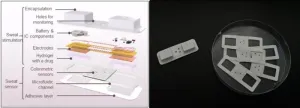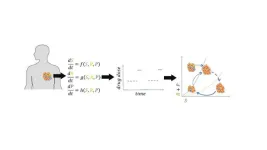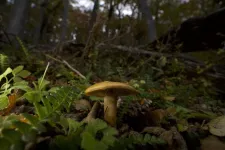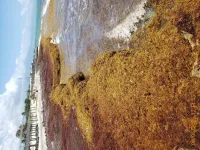(Press-News.org) Some teabags manufactured using plastic alternatives do not degrade in soil and have the potential to harm terrestrial species, a new study has shown.
The research looked at commonly available teabags made using three different compositions of polylactic acid (PLA), which is derived from sources such as corn starch or sugar cane.
The teabags were buried in soil for seven months, and a range of techniques were then used to assess whether – and to what extent – they had deteriorated.
The results showed that teabags made solely from PLA remained completely intact. However, the two types of teabags made from a combination of cellulose and PLA broke down into smaller pieces, losing between 60% and 80% of their overall mass and with the PLA component remaining.
The study also examined the impacts of the discs cut from the teabags on a species of earthworm, Eisenia fetida, which has a critical role in soil nutrient turnover as it consumes organic matter.
Researchers found that being exposed to three different concentrations of teabag discs – equivalent to the mass of half, one and two teabags – resulted in up to 15% greater mortality, while some concentrations of PLA had a detrimental effect on earthworm reproduction.
Writing in the journal Science of the Total Environment, the study’s authors highlight the need for accurate disposal information to be clearly displayed on product packaging.
Only one of the manufacturers whose products were chosen for the study indicated on the packaging that the teabags were not home compostable.
This could lead to them ending up in soil, while there is also high potential for consumer confusion about the meaning of terms such as plant-based or biodegradable, emphasising the need for clear guidance on appropriate disposal.
Dr Winnie Courtene-Jones, Post-Doctoral Research Fellow at the University of Plymouth, is the study’s lead author. She said: “In response to the plastic waste crisis, biodegradable plastics such as PLA are being used in an increasing range of products. This study highlights the need for more evidence on the degradation and possible effects of such materials before their use becomes even more widespread, and to prevent the generation of alternative problems if they are not properly disposed of.”
The study was designed to replicate the environmental conditions into which teabags might be discarded on account of a lack of clear labelling as to how they should be disposed.
It used analytical techniques such as size exclusion chromatography, nuclear magnetic resonance, and scanning electron microscopy allowing scientists to examine not just how the teabags had changed visibly but also structurally.
Study co-author Professor Antoine Buchard, formerly of the University of Bath and now Professor of Sustainable Polymer Chemistry at the University of York, added: “PLA is a bioderived plastic with a reduced carbon footprint compared to traditional plastics, which also degrades under industrial composting conditions. Using a number of chemical analysis techniques, we've shown that when it is not properly disposed of, for example after seven months in the soil, its molecular structure remains intact. Labels such as biodegradable and compostable have the potential to mislead the public, therefore it is important that scientists, policy makers and manufacturers work together to ensure clear standards are followed and that the public has easy access to information on where to dispose of those new plastics.”
The research was carried out as part of BIO-PLASTIC-RISK, a four-year £2.6million project led by the University of Plymouth and funded by the Natural Environment Research Council (part of UK Research and Innovation). It is assessing how biodegradable packaging and products break down and, in turn, whether the plastics or their breakdown products affect species both on land and in the marine environment.
It also builds on previous research suggesting that some products labelled as biodegradable, including carrier bags, do not disintegrate after as much as three years in the environment.
The study has been published in the wake of the fourth session of the Intergovernmental Negotiating Committee (INC-4), where world leaders and scientists were among those to continue discussions towards the Global Plastics Treaty.
Study co-author Professor Richard Thompson OBE FRS, Head of the University of Plymouth’s International Marine Litter Research Unit and lead of the BIO-PLASTIC-RISK project, is a co-coordinator the Scientists’ Coalition for an Effective Plastics Treaty. He said: “After 30 years of research on plastic pollution I am delighted there is now a global consensus, as evidenced by the UN Plastics Treaty, that current production use and disposal of plastic is unsustainable. But it is with immense frustration that I see alternative and substitute materials entering the market without clear guidance on how their benefits might be realised. Even if consumers understand how to dispose of these products only around half of households in the UK currently have access to the necessary waste streams for the type of composting required. It is essential we learn from the mistakes we made with plastic materials by testing and labelling these novel materials in relation to the prevailing waste management infrastructure.”
Dr Mick Hanley, Associate Professor in Plant-Animal Interactions at the University of Plymouth and senior author on the study, added: “In this study PLA-based teabags did not fully deteriorate, and it seems that composting worms may be harmed by them. The lack of clear labelling can lead to consumers disposing of teabags in their compost, where any limit to complete degradation of the material raises the potential for plastics to enter the soil when compost is added to the garden, with potential impacts on garden wildlife and uptake by food plants.”
END
Study suggests ‘biodegradable’ teabags don’t readily deteriorate in the environment and can adversely affect terrestrial species
2024-05-28
ELSE PRESS RELEASES FROM THIS DATE:
Algorithms could help improve judicial decisions
2024-05-28
A new paper in the Quarterly Journal of Economics, published by Oxford University Press, finds that replacing certain judicial decision-making functions with algorithms could improve outcomes for defendants by eliminating some of the systemic biases of judges.
Decision makers make consequential choices based on predictions of unknown outcomes. Judges, in particular, make decisions about whether to grant bail to defendants or how to sentence those convicted. Companies now use machine learning based models increasingly in high-stakes decisions. There are various assumptions about human behavior underlying the deployment of ...
Scientists uncover a multibillion-year epic written into the chemistry of life
2024-05-28
The origin of life on Earth has long been a mystery that has eluded scientists. A key question is how much of the history of life on Earth is lost to time. It is quite common for a single species to "phase out" using a biochemical reaction, and if this happens across enough species, such reactions could effectively be "forgotten" by life on Earth. But if the history of biochemistry is rife with forgotten reactions, would there be any way to tell? This question inspired researchers from the Earth-Life Science Institute (ELSI) at the Tokyo Institute of Technology, and the California Institute of Technology (CalTech) ...
Monitoring diseases through sweat becomes accessible to everyone
2024-05-28
Sweat contains biomarkers that can monitor various health conditions, from diabetes to genetic disorders. Sweat sampling, unlike blood collection, is preferred by users due to its painless nature. However, to obtain sufficient nutrients or hormones from sweat for testing, intense physical activity was previously required to induce sweat. This method posed challenges for individuals with limited mobility.
Dr. Kim Joohee from the Bionics Research Center at the Korea Institute of Science and Technology (KIST, Director Oh Sangrok) and Professor John A. Rogers from Northwestern University jointly announced the development ...
Mathematical model driven evolutionary therapy dosing exploiting cancer cell plasticity
2024-05-28
Cancer poses significant challenges due to the development of resistance and the likelihood of relapse. Resistance may arise from permanent genetic changes in cancer cells or non-genetic alterations in cancer cell behavior induced by treatment. Standard of care in cancer treatments typically involves administering the maximum tolerated dose of a drug to eradicate drug-sensitive cells effectively. However, this approach often fails in the long term because drug-resistant cancer cells can grow more rapidly when all drug-sensitive cancer ...
Biodiversity in the margins: Merging farmlands affects natural pest control
2024-05-28
A new study published in the Journal of Applied Ecology demonstrates how the diversity and abundance of arthropods decrease when hedgerows and field margins covered by wild grass and flowers are removed.
Researchers from the UK, Netherlands and China studied 20 rice fields in China for six years to see how the changing agricultural landscape affects the diversity and abundance of rice pests and their natural enemies, as well as the effect on rice yield.
Traditional Chinese smallholder fields are irregularly shaped and separated by areas of hedgerows, wild grass, and flowers. Using large-scale machinery in these farmlands is difficult, so there is low agricultural ...
1 in 8 pregnant people have a disability, but significant gaps exist in the provision of accessible care
2024-05-28
Toronto, ON, May 28, 2024 – People with disabilities account for 13% of all pregnancies in Ontario, but a new report shows that this population was more likely to experience pregnancy complications such as emergency department visits, hospitalizations, and preterm birth.
Researchers from ICES, the University of Toronto Scarborough, and the Centre for Addiction and Mental Health (CAMH) have released a landmark report detailing findings from one of the largest studies to date on disability and pregnancy.
Funded by the US National Institutes of Health, the Disability and Pregnancy Study used healthcare ...
Statins associated with decreased risk for CVD and death, even in very old adults
2024-05-27
Embargoed for release until 5:00 p.m. ET on Monday 27 May 2024
Annals of Internal Medicine Tip Sheet
@Annalsofim
Below please find summaries of new articles that will be published in the next issue of Annals of Internal Medicine. The summaries are not intended to substitute for the full articles as a source of information. This information is under strict embargo and by taking it into possession, media representatives are committing to the terms of the embargo not only on their own behalf, but also on behalf of the organization they represent.
----------------------------
1. Statins associated with ...
Climate change is moving tree populations away from the soil fungi that sustain them
2024-05-27
As our planet warms, many species are shifting to different locations as their historical habitats become inhospitable. Trees are no exception – many species’ normal ranges are no longer conducive to their health, but their shift to new areas that could better sustain them has been lagging behind those of other plants and animals. Now, scientists show that the reason for this lag might be found belowground. A study published in PNAS on May X, shows that trees, especially those in the far ...
Secrets of sargassum: Scientists advance knowledge of seaweed causing chaos in the Caribbean and West Africa
2024-05-27
Researchers have been working to track and study floating sargassum, a prolific seaweed swamping Caribbean and West African shorelines, and causing environmental and economic harm.
The stranded seaweed blocks fishing boats; threatens tourism; disrupts turtle nesting sites, reefs and mangroves, and releases toxic gas, which impacts human health and damages electrical equipment.
First reported by Christopher Columbus in the 15th century, floating mats of sargassum have long been present in the North Atlantic. However, since 2011, a floating population has established ...
Bioinformatics approach could help optimize soldiers’ training for improved readiness and recovery
2024-05-27
Of the many perils facing members of the military, injuries incurred in training or on deployment repeatedly sideline elite operators.
“It’s a pervasive problem,” says Dhruv Seshadri, an assistant professor of bioengineering in Lehigh University’s P.C. Rossin College of Engineering and Applied Science. “We’re looking at how we can integrate physiological data, biomechanical data, and subjective assessments to help reduce the risk of these injuries happening in the first place, and when they do happen, how we can use those data to accelerate the soldier’s return to operation.”
Seshadri ...






